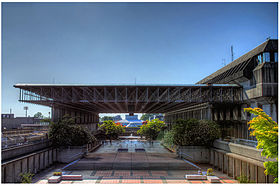
Wikipedia photo
When I enrolled at Simon Fraser University, I anticipated an academic education. What I received was also an education in life. During my years as a student, 1967-1971, the university came under the influence of professors and student leaders with radical, anti-establishment, anti-corporation, anti-American views. It was the time of the counter culture and my conservative Mennonite upbringing and outlook were significantly challenged. I entered the university a small town sheltered young man. I emerged at the other end of the experience changed, probably somewhat radicalized in my views.
It had been with considerable trepidation that I had given in to the urging to begin this journey. The main reason for my hesitation was the realization that I would have difficulty reading the small print in text books. Extensive reading of small print was becoming an issue for me.
The winds of change were already blowing strong on a number of U.S. and Canadian campuses when I began attending lectures in the Quad at SFU. Berkley was a hotbed of student unrest. Four students were shot by National Guardsmen at Kent State. Groups like The Black Panthers, Students for a Democratic Society (SDS), and The Chicago Seven were creating anxiety and fear among conservative minded citizens, especially in America. At concerts and rallies of the young, Joan Baez and Bob Dylan sang of freedom, change and protest. One of the main reasons for the disquiet in the United States was the unpopular war in Vietnam. In a very real sense, the earth was shifting on its moral and values axis.
The thinking behind much of the protest originated with Karl Marx and Friedrich Engels. Their ideas were embraced, adapted and propagated by a number of highly articulate intellectuals. Author, professor and public speaker Herbert Marcuse became one of the better known and most influential of these. He advocated intolerance of right wing political movements and tolerance of left wing movements. His critiques of capitalism inculcated the young generation with a growing anxiety and distrust of the society in which they were growing up. The leaders of what became known as the New Left fomented emotions of anger and despair.
In Canada, SFU was in the forefront of this philosophical shift taking place especially among university students.
